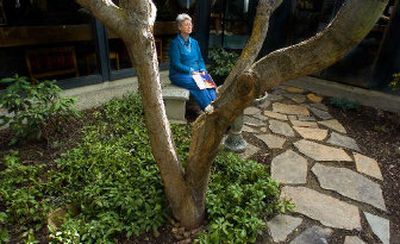Harnessing the force of forgiveness

Anger consumed her.
It pervaded her life to the extent that Sue Koentopp could no longer sleep at night. During the day, she was irritable and tired, unable to focus on her job.
Her mother was dying of cancer. She was feuding with her sister. She felt unfulfilled in her career.
“I was in this horrible angry place,” recalled the Spokane resident. “I felt sorry for myself. The anger took over my life.”
In her search for solace, Koentopp discovered peace in a simple, yet often difficult act: She learned to forgive.
Widely discussed at church, in countless self-help books and on talk shows like “Dr. Phil” and “Oprah,” forgiveness has become one of those topics that have quickly spread from the realm of religious thinking to the sphere of science, research and popular culture. For some, forgiveness is more than just a theme during Lent, the 40-day period that started last week with Ash Wednesday; it’s a moral imperative.
For Koentopp and others in the Inland Northwest, forgiveness is a spiritual practice – one that’s not only good for the soul, but good for one’s health. It’s also a loving act, they say, a step toward stronger relationships, healthier communities and maybe even world peace.
Forgiveness is the theme of several lectures in Spokane this week.
On Thursday and Friday, Holocaust survivor and clinical psychologist Edith Eger will talk about her experience as a teenager at Auschwitz, where the Nazis killed her parents. Despite the trauma and loss, Eger survived and was able to pray for – and forgive – the people who killed her loved ones and millions of other Jews. She’ll share her story at Whitworth College during two lectures titled, “Reconciling and Forgiveness” and “Reconciling with My Enemy.”
“Edith Eger offers a true model of reconciliation and forgiveness through her life story,” said Ginny Whitehouse, associate professor of communication studies at Whitworth. “She has known evil and has made peace with pain. Instead of crumbling under the weight of memory, she has turned her Auschwitz experience into a vocation to help others heal.”
Also on Friday, and during an all-day workshop Saturday, best-selling author Colin Tipping will talk about “radical forgiveness” at Unity Church, a South Hill congregation dedicated to “spiritual discovery.”
“Traditional forgiveness – just letting bygones be bygones – doesn’t do it,” Tipping said during an interview from his office, the Atlanta-based Institute for Radical Forgiveness. “Radical forgiveness works on a more spiritual level. It’s instantaneous, simple and easy. It’s a spiritual technology that uses our innate spiritual intelligence.”
During his lectures and workshops, Tipping asks participants to shift their perspectives. Instead of feeling victimized, he advises them to view the challenges and traumatic events in their lives as learning experiences that are “part of a divine plan.”
“Everything happens for a reason,” he tells them. “Forgiveness is not so much something we do; rather it is a spiritual viewpoint that we are willing to take.”
Tipping, who travels all over the world to teach the tools of “radical forgiveness,” started on this path of spiritual and emotional healing in the mid-1980s, when he used his skills as a licensed hypnotherapist to work with cancer patients. A strong believer in the mind-body connection, he found that people’s capacity for forgiveness had an effect on their health and ability to cope and heal.
Numerous studies on the correlation between granting forgiveness and health also support his experience. A January 2005 article from Harvard Women’s Health Watch noted how learning to forgive can benefit a person’s mental and physical well-being. Some of the benefits include: reduced stress, better heart health, stronger relationships, reduced pain and greater happiness.
Koentopp, a member of Unity Church who now leads study groups on radical forgiveness, said learning how to forgive got her out of that “poor-me mode” and gave her life more clarity.
After learning about forgiveness through Tipping’s books, the 54-year-old has become calmer and more relaxed, she said, and no longer burdened with grudges and that heavy aura of negativity.
“Anger and hate are time-consuming and energy-draining,” said Pat Mertens of Cheney, who first learned about Tipping’s radical forgiveness teachings a year ago. “I still grumble and groan, but now I have a tool to work out my emotions, and I don’t waste as much time being upset. I’ve become more open to life’s more joyful experiences.”